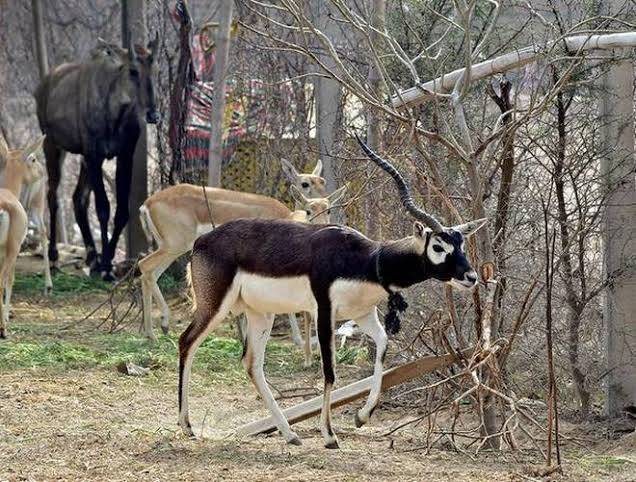
Recently the Lahore High Court announced its verdict directing the Punjab government to take safety and precautionary measures in order to protect a vulnerable species of antelope known as the Blackbuck. This is a vulnerable species that has the protection of the Punjab Preservation and Protection of Wildlife Act and is included in the third schedule which describes the list of animals and birds which are vulnerable as declared by CITES (Convention on International Trade of Endangered Species).
I represented the petitioner before the honourable Lahore High Court and I argued that the blackbuck population is deteriorating due to the illegal hunting permits granted and the lack of safety measures taken by the Punjab government. I also argued that after the eighteenth amendment to the constitution of the country, the protection of biodiversity and the ecosystem has been vested with the provinces. Therefore the Punjab government is negligent in performing its statutory obligations. As a source of evidence we attached news clips to corroborate the fact that populations of blackbucks in the Cholistan Desert and Lal Suhanra park in Bahawalpur are deteriorating. Therefore, we argued, the honourable Lahore high court should exercise its judicial review powers under Article 199 of the constitution of Pakistan 1973 and issue a writ of mandamus to the Punjab government and Director General of the Wildlife Department to take adequate measures in order to save this endangered species.
It was really an uphill battle as it took more than three-and-a-half years to prove the fact that the government is not bothered to protect the animal rights as enshrined in Punjab Protection and Preservation of Wildlife Act 1972 as well as in Prevention of Cruelty on Animals Act. It was very painful for us when the law officers appearing on behalf of Punjab Government stated that it was a frivolous litigation in order to gain publicity and media attention on our part.
It has become a routine matter that law officers appearing on behalf of government, without any preparation, try to convince the court through flimsy allegations that the litigation has been filed to attract publicity. Activists or lawyers should never get bogged down by such cheap criticism because whenever any new idea emerges or any genuine public interest litigation is filed, there are people in the lawyers' fraternity who show their jealousy and insecurity by spewing venom on those lawyers who bring good causes to the court.
In this respect, we must be grateful to the honourable Lahore high court Chief Justice Syed Mansoor Ali Shah who took this issue seriously. Subsequently the honourable Chief Justice Yawar Ali (now retired) appointed a commission headed by Dr Pervez Hassan to propose measures to safeguard the vulnerable species of blackbucks keeping in view the precautionary principle. Fortunately, the commission headed by Dr Pervez Hassan, also gave its findings that the population of the vulnerable species is deteriorating and unless or until the Punjab government imposes a ban on hunting it along with taking precautionary measures, the situation is not going to improve. Dr Pervez Hassan also apprised the court that the litigation was absolutely genuine and the need of the hour. He stated that the court must recognize its judicial review powers as the right of life contained in Article 9 of the Constitution includes protection of biological diversity and environment. The honourable Chief Justice was shocked to know that over a period from February 2016 to December 2016, 86 blackbucks were born and 46 had already met a natural death due to a lack of care.
It took a lot of arduous work by Dr Pervez Hassan who, through his dedication and diligence, formulated a report and proposed that the government should increase its spending as well as its capacity for the protection of endangered species. Secondly the commission also proposed that since the blackbuck is in the third schedule of the Punjab Preservation and Protection of Wildlife Act 1972, therefore no hunting permits should be issued. The honourable court later on summoned Director General Wildlife Mr Suhail Ashraf. He also endorsed the commission's recommendations and thereupon the court directed the Punjab government to implement these recommendations in letter and spirit for the protection of the vulnerable blackbuck.
In developing countries it is very unfortunate that people lack awareness on animal rights and this is also one of the reasons that animals are being subjected to torture and burdensome load. This is tantamount to inflicting cruelty. Hence the education institutions should play a pivotal role in enlightening the youth about animal rights. The Holy Quran contains many examples and directives about how Muslims should treat animals. The Quran teaches us that animals form communities, just as humans do: “There is not an animal that lives on the earth, nor a being that flies on its wings, but they form communities like you. Nothing have we omitted from the Book, and they all shall be gathered to their Lord in the end” (Quran 6:38)
Similarly, the Holy Prophet ({BUH) exhorted Muslims to show kindness and compassion towards animals and birds. He repeatedly forbade cruelty towards animals, for instance in the following hadith:
“Whoever is merciful even to a sparrow, Allah will be merciful to him on the Day of Judgment.”
The government and civil society should focus on animal welfare in educational institutes. They must inform functionaries including the police about animal rights, encourage media exposure and appoint animal health inspectors. Additionally they must celebrate International Animal Rights Day, World Animal Day and World Wildlife Day to create awareness.
The writer is an animal rights activist, constitutional lawyer and a teacher. He can be contacted at sheraz.zaka@gmail.com
